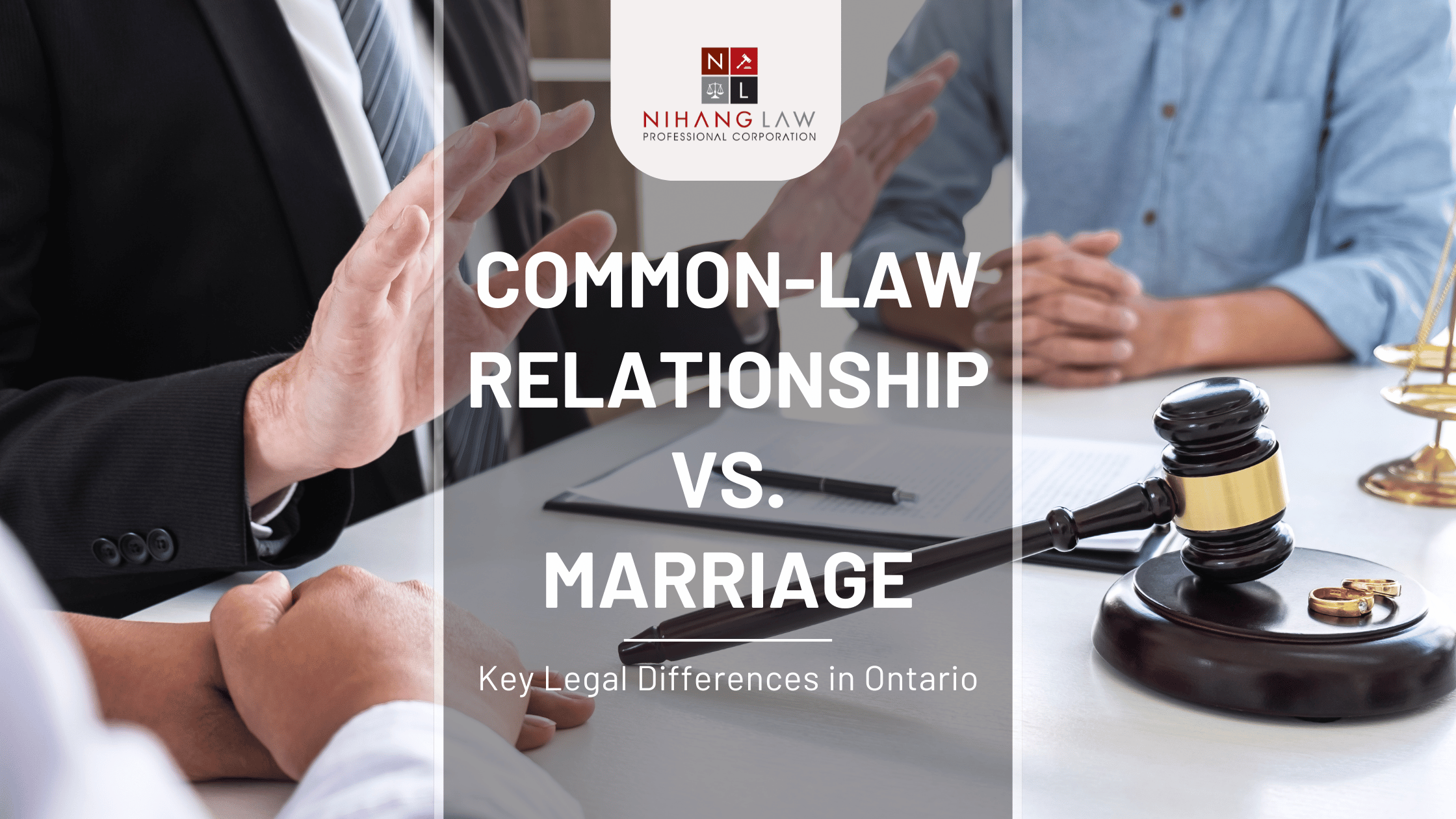
20th May 2025BY Nihang Law
Defining the Key Legal Differences in Common-Law Relationships vs. Marriage in Ontario
Many couples in Ontario choose to live together without getting legally married. While common-law relationships share some similarities with marriage, they also have key legal differences—especially regarding property rights, spousal support, and estate planning. Understanding the distinctions between common law vs. marriage is crucial to protecting your interests and making informed decisions about your situation.
What Is a Common-Law Relationship in Ontario?
In Ontario, a couple is considered to be in a common-law relationship if they:
- Have lived together continuously for at least three years in a conjugal relationship, or
- Have lived together for less than three years but have a child together and have been in a relationship of some permanence.
While common-law partners may have similar rights as married spouses in certain areas, there are significant legal differences.
Key Legal Differences Between Common-Law Relationships vs. Marriage
| Topic | Common-Law Relationships | Marriage |
| Property Division | There is no automatic property division. Each partner keeps the property they own, unless the other partner can prove they contributed significantly to it (e.g., financially or through maintenance/upkeep) and make a claim under unjust enrichment. | Under Ontario’s Family Law Act, married spouses have an automatic right to equal division of property accumulated during the marriage. This includes the family home, which must be split regardless of whose name is on the title. |
| Family Home | If the home is in one partner’s name, the other partner has no legal right to stay unless they successfully make a claim in court. | Both spouses have an equal right to stay in the matrimonial home, even if only one spouse’s name is on the title. |
| Spousal Support | Common-law partners may also be entitled to spousal support after separation if one partner is financially dependent on the other. However, they must meet the eligibility requirement of having lived together for at least three years or having a child together. | Married couples may be entitled to spousal support after separation if one partner is financially dependent on the other. |
| Inheritance and Estate Rights | There is no automatic inheritance right. If a common-law partner dies without a will, the surviving partner will not inherit anything unless specifically named in the will. This makes estate planning crucial for common-law couples. | If a spouse dies without a will, the surviving spouse is automatically entitled to inherit under Ontario’s Succession Law Reform Act. |
| Pension and Benefits | Pensions fall into two categories: CPP and all other pensions. A common-law spouse may claim a division of CPP pension credits accumulated during the relationship, granted they have cohabited for at least one year. For all other pensions, standard family property rules apply, which means common-law spouses do not have an automatic right to them. However, if you can show that you contributed to the growth of your partner’s union pension, you may be eligible for a share of it. | Married spouses have automatic entitlements to workplace pensions. |
How to Protect Yourself in a Common-Law Relationship
If you’re in a common-law relationship in Ontario, here are some legal steps you can take to protect your rights:
- Cohabitation Agreement: This legal document outlines how assets and financial matters will be handled if the relationship ends.
- Wills and Estate Planning: Since common-law partners do not have automatic inheritance rights, creating a will ensures your partner is provided for in the event of your passing.
- Joint Ownership Agreements: If you’re buying property together, ensure both names are on the title or establish an agreement outlining contributions and ownership rights.
How Nihang Law Can Help
While common-law relationships provide some legal protections, they are not the same as marriage in Ontario. Understanding the differences in property rights, spousal support, and estate planning is essential to ensuring both partners are legally protected. If you are in a common-law relationship and have questions about your rights, consulting a family law lawyer can help you navigate your legal options in Ontario.
At Nihang Law, we help couples protect their interests through cohabitation agreements, estate planning, and family law representation. Contact us today to discuss your situation and get tailored legal advice.
Thank you for reading this post, don't forget to subscribe!



